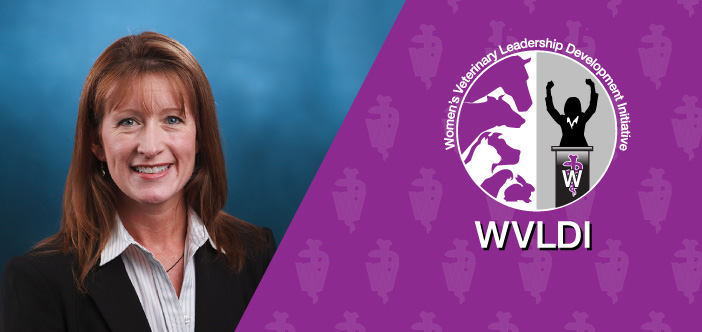
Witness its major presence and inviting persona at the American Veterinary Medical Association convention this weekend in Denver, which could prove to be the launching pad for something big.
The brainchild of Vermont veterinarian Dr. Karen Bradley and others as a vehicle for women veterinarians to network through social media and connect with those interested in leadership, WVLDI is seeking to bridge the huge leadership chasm in a profession that has swung from male dominated in the last century to heavily female today. Bottom line: There are large numbers of women in the field and a small number in decision and policy-making roles.
From its infancy and small discussion groups at last July’s AVMA convention in Chicago, the Initiative is moving ahead full throttle with a diverse 11-member board of directors and open AVMA recognition by including it in its prestigious Hot Topics session Sunday, “The Initiative to Develop Women Leaders in Veterinary Medicine,” where Bradley, its president, and Texas veterinarian Dr. Stacy Pritt, president elect, will review WVLDI origins and discuss its future direction.
During this year the WVLDI has obtained 501 (c) 3 status, entered into a collaboration with AVMA and secured corporate funding ($15,000) from Ceva Animal Health.
Other WVLDI programs at the huge convention include: “Develop Practical Skills for Becoming Confident & Effective Leaders,” “Women’s Leadership Development Symposium,” “Women’s Leadership: Minding the Gap and Sharing Solutions,” “Women of Vetlandia: Secrets to Success in the World of Organized Veterinary Medicine,” “Stories from the Trenches: Leaders from Multiple Areas of Veterinary Medicine Share Experiences and Lessons Learned,” “Round Table Wrap Up: Q&A and Healthy Discussion.”
“Stacy and I put our heads together with Julie Kumble, a women’s study expert, in Chicago, and began the process of creating a community for developing and encouraging women veterinary leaders, “ says Bradley. “It felt like it was time to do something, and perhaps do it in a way that had not been done before.
“We post articles and materials on our Facebook, Twitter and LinkedIn feeds frequently, to inspire and support female veterinarians, letting them know they are not alone in their day-to-day challenges as professionals and harmonizing that in their daily lives.
Bradley and Pritt will introduce attendees to some pretty staggering statistics, which should suggest a need for taking the Initiative forward from a loosely-organized, social-media group to a prominent and effective organization within the profession.
Look at this data: 78 percent of veterinary graduates are female; 55 percent of U.S. veterinarians are female; there is 1 female AVMA executive board voting member (effective July 29). The AVMA House of Delegates has only 33 percent females.
For Bradley, nurturing the Initiative since its inception, has been a huge commitment and labor of love while also finding time to serve in the AVMA House of Delegates, chair the AVMA Governance Engagement Team and operate a veterinary hospital with two co-owners in Vermont.
Here’s a taste of what life’s been like for her the last year and how she envisions the Initiative going forward:
How has forming this Initiative changed your life the past year?
Well, I used to think I was busy, packing in veterinary volunteer work on top of my veterinary and family priorities, but this Initiative has jumped to the top of my short-term priorities.
How would you categorize the response the past year to the Initiative?
It has been incredible. I feel like we touched a nerve and have prompted healthy conversations. It is easy to observe a problem and complain about it. But what I am seeing and hearing is solid inquiry about why this gender leadership gap exists in our profession and what we need to do about it.
How much time do you spend on it in an average week?
Every day I try to post on social-media sites interesting articles, congrats to someone for an achievement or links to interviews. I average a conference call or at least e-mail dialogue on WVLDI functions or agendas no less than once a week – some weeks daily.
How would you characterize your WLVDI experience?
I find the activities very fulfilling. They have enabled me to connect with many interesting and amazing veterinarians, male and female. We are building a supportive environment for leaders to network and encourage or empower each other to move forward.
Are you optimistic, pessimistic or uncertain about the Initiative’s future?
I am a natural optimist so I view its future brightly.
Do you envision the Initiative segueing into a formal organization, and, if so, what would be the timetable?
We are at a pivotal point. What started as a small band of people has grown quickly and evolved into student chapters at several of the nation’s veterinary schools with an overwhelming response to join the effort. We are having a strategic planning session at AVMA to determine the best way forward.

